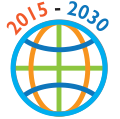 Southern Africa \ 2030 agenda for sustainable development
Southern Africa \ 2030 agenda for sustainable development
The global development agenda impacts directly on the work of local government, which is responsible for the delivery of many of the key services that will contribute towards the achievement of global targets. A Global Taskforce, of which CLGF is a member, has worked to ensure greater understanding and recognition of local government’s contribution to meeting global and national development targets. Local government’s engagement with the Agenda 2030 and the new Sustainable Development Goals; efforts to reduce the impacts of climate change; the Addis Ababa Agenda for Action on financing development; Habitat III and the New Urban Agenda, and others is being increasingly recognised. This section provides material on the global development agenda, information on how local government is contributing to global development targets, and information about multilateral and bilateral donor strategies relevant to local government. CLGFs work is informed by global development initiatives which we proactively contribute to on behalf of our members, such as through the Global Taskforce of local and regional governments for post-2015 development agenda towards Habitat III. This includes the 2030 agenda for sustainable development which will guide and inform development priorities over the next 15 years, and Habitat III - the third UN conference on Housing and Sustainable Urban Development in 2016.
Sub-topics:
- Development partner policies
- International treaties and commitments
- Sustainable Development Goals
- Climate change
Featured
Policy and planningUrban In the world's poorest countries, cities could be the Sustainable Development Goals test
Author: Gordon McGranahan Publisher: IIED Publication year: 2017
Commonwealth Ministers Reference Book 2017
A Report aimed at fostering sustainable economic, social and environmental development across the Commonwealth, featuring perspectives from some of the world's leading commentators.
Author: Royal Commownealth Society Publisher: Henley Publication year: 2017
UN and SDGs: A Handbook for Youth
"UN and SDGs: A Handbook for Youth" explores SDGs and the 2030 Agenda from a youth perspective. In the first chapter, it introduces the concept of sustainable development and outlines its historical development through the transition from Millennium Development Goals (MDGs) to SDGs. The second chapter discusses how youth can be harnessed as a major agent of change in achieving sustainable development, focusing on several pertinent youth issues in Asia and the Pacific. The final chapter introduces the UN system and its regional arm, ESCAP, explaining their role in the successful implementation of SDGs.
Author: UNESCAP Publisher: UNESCAP Publication year: 2017
Localising the sustainable development goals (SDGs) : the role of local government in context
The United Nations (UN) has of late been debating the new international development framework that will replace the Millennium Development Goals (MDGs) post–2015. This process has been popularly referred to as the post-2015 development agenda. It is a fact that many of the sustainable development goals (SDGs) that have been identifi ed will impact on the role and responsibilities of local government, namely, poverty reduction; access to water and sanitation; health; education; economic growth; development of cities and human settlements; and resilience to climate change. A critical issue that was highlighted when the MDGs were introduced in 2000 was the implementation modalities as it was felt that the process and goals were primarily top down (CLGF 2014:3). Consequently, there has been strong advocacy for local government to be a key implementation partner in the achievement of the new sustainable development goals that would have been finalised in September 2015 (www.worldwewant2015.org/ localising2015; CLGF 2014:3; www.capacity.undp.org; Slack 2014:1). Key aspects of the debate and discussion to date have been how to localise the new development framework, evaluate the local impact of the future SDGs and ensure that the local dimension is prioritised and successfully implemented (UNDP 2014a:3). There is a firm belief that the issue of localisation has to extend beyond national, provincial/state/regional implementation and there should be a focus on how the new development agenda will be implemented locally and the implications for the local level of government in this regard. According to the UN, localisation denotes the “process of defining; implementing; and monitoring strategies at the local level for achievable global, national and subnational sustainable goals and targets” (UNDP 2014a:3). This process would involve the utilisation of distinct tools, mechanisms, strategies, platforms and innovations to ensure that the development agenda is effectively translated into firm action and concrete results at the local level to benefit communities. It is envisaged that it will be an inclusive process and will move beyond the municipal jurisdiction to draw in relevant stakeholders to create a strong and capable local authority. Viewed in this context, localisation is an integral part of the multilevel governmental system and more so in terms of attaining the sustainable development goals that will be shortly adopted by the international community (CLGF 2014:3).
Author: PS Reddy Publisher: African Journal of Public Affairs Publication year: 2016
The Commonwealth Local Government Forum: An Overview
The Commonwealth Local Government Forum (CLGF) was established in 1994, coinciding with rapid moves towards decentralisation at that time, especially in Commonwealth Africa. It uniquely brings together national associations of local government and individual councils, ministries responsible for local government, and training and research institutes with an interest in local government, on a common platform. This reflects an understanding that local government needs effective central government and vice versa if decentralisation is to be truly successful, and that research, training and practice need to be brought together in a constructive and creative way.CLGF’s developmental work can be divided into three main categories:Promotion and advocacy of local democracy and good governance, Exchange of experience, and Capacity building.This article provides a brief overview of the activities and projects which CLGF has underway in respect of these objectives. It will be complemented by more detailed papers on specific programmes and projects in this and future issues of the Commonwealth Journal of Local Governance
Author: Lucy Slack Publisher: University of Technology, Sydney Publication year: 2008



